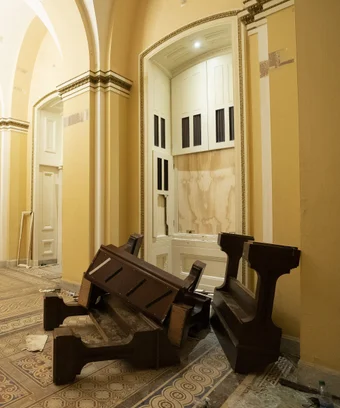UNIONS OPPOSE USE OF PRISON LABOUR
White Supremacists Attacked The Capitol. Now, Prison Labor Will Clean Up The Mess
WHIZY KIMLAST UPDATED JANUARY 8, 2021,

PHOTO: KBD/UPI/SHUTTERSTOCK.
On Wednesday, January 6, a violent mob of Trump supporters stormed and occupied the Capitol in an attempt to stop Congress from counting the electoral votes that would confirm Joe Biden as the 46th president. At the time of writing, five people have died as a result of the insurrection.
After the mob was sufficiently amused by their selfies and live streams and had stolen enough artifacts to remember the insurrection, they left behind a heap of broken glass, furniture, and trash — and also a very important question. Who, exactly, would clean up this mess? It's important to ask exactly whose labor we rely on to return to a veneer of normalcy and civility in the wake of a violent riot of white supremacists. Does the U.S. government go antiquing for some replacement mahogany desks?
As TikTok user Jessica Jin (@jinandjuice) explained in a viral video yesterday, one possible replacement for damaged government furniture could be new pieces produced by incarcerated people in federal prisons:
Related Stories

Police Treat White Rioters Like Their Lives Matter

Let's Not Forget That Nazi's Stormed The Capitol

Why Inmates Were Fighting California Wildfires
@jinandjuice
Cleaning up after a coup is literally dirty business. #coup #fyp #congress #capitol #furniture #justice #prisonlabor #america♬ original sound - jessica jin
Federal Prison Industries (FPI), also known as UNICOR, is a government-owned corporation that uses prison labor to produce everything from office furniture to awards and plaques. As Jin explains in the video, FPI is a "mandatory source" for government agencies, meaning it must be given priority when the government is considering the purchase of goods of the kind that FPI manufactures, such as office furniture. After an agency realizes it doesn't have the goods it needs in its inventory, and other agencies don't have excess supplies, it must next consider if FPI's products are comparable to other commercial sources for "price, quality, and time of delivery."
There are exceptions to this process, which means it's not as simple as every single government office chair having to be sourced from FPI — but according to the Federal Acquisition Regulation, which lays out the rules for the federal government to procure goods and services, "agencies are encouraged to purchase FPI supplies and services to the maximum extent practicable [emphasis added]." According to its fiscal year 2019 annual management report, "FPI sells products and services to the majority of federal departments, agencies, and bureaus."
Prison labor has a long history in our country, codified by the 13th Amendment, which outlaws slavery and indentured servitude in the U.S. "except as a punishment for crime." Within federal prisons, FPI jobs are coveted as some of the higher-paying ones — boasting rates between 23 cents to $1.15 an hour. Federal inmates are required to work unless medically exempt, with workdays lasting upwards of 12 hours, and a large portion of their meager earnings automatically go toward "court-ordered fines, victim restitution, child support, incarceration fees, and other monetary judgments" and paying for their own room and board in prison — paying to be imprisoned.
While Jin's TikTok focused specifically on replacing items in the Capitol, prison labor goes beyond federal buildings. Many state universities also procure furniture produced by the exploitation of incarcerated people; inmates pick potatoes in Idaho, fight California wildfires, and during COVID, inmates in New York have been forced to make hand sanitizer — a product they were not allowed to use themselves.
The government, for its part, insists that prison labor is for the good of incarcerated people. FPI's website claims that it is "first and foremost, a correctional program," and on a page that delves into the corporation's history, states that "despite periods of criticism from detractors, increasingly constrictive procurement laws, misinformation and stigma associated with the value of inmate-made goods, prison industry work programs have endured."
Prison labor pretends that forcing incarcerated people to work for little to no pay is meant to be rehabilitation, a generous path to moral salvation. FPI claims that their laborers show reduced instances of recidivism, but the Government Accountability Office reported this year that in fact, FPI had not "reviewed its impact on recidivism (a person's relapse into criminal behavior) in over two decades." Overall, there is very little data on the idea that prison labor programs are effective in their stated intent to rehabilitate.
What is clear is that it can be a profitable enterprise. In the 2019 fiscal year, FPI employed about 16,500 people incarcerated in federal prisons. Its biggest customer is the Department of Defense, which provides FPI with over half of its total sales. In 2019, its net sales were about $531,453,000.
Given the incomparably higher rates of incarceration of Black Americans compared to white Americans, the exploitation of incarcerated people isn't simply a labor issue. More precisely, it's an intended function of institutional racism — what many call modern-day slavery — rearing its ugly head in the aftermath of a display of violent white supremacy.

PHOTO: KBD/UPI/SHUTTERSTOCK.
On Wednesday, January 6, a violent mob of Trump supporters stormed and occupied the Capitol in an attempt to stop Congress from counting the electoral votes that would confirm Joe Biden as the 46th president. At the time of writing, five people have died as a result of the insurrection.
After the mob was sufficiently amused by their selfies and live streams and had stolen enough artifacts to remember the insurrection, they left behind a heap of broken glass, furniture, and trash — and also a very important question. Who, exactly, would clean up this mess? It's important to ask exactly whose labor we rely on to return to a veneer of normalcy and civility in the wake of a violent riot of white supremacists. Does the U.S. government go antiquing for some replacement mahogany desks?
As TikTok user Jessica Jin (@jinandjuice) explained in a viral video yesterday, one possible replacement for damaged government furniture could be new pieces produced by incarcerated people in federal prisons:
Related Stories

Police Treat White Rioters Like Their Lives Matter

Let's Not Forget That Nazi's Stormed The Capitol

Why Inmates Were Fighting California Wildfires
@jinandjuice
Cleaning up after a coup is literally dirty business. #coup #fyp #congress #capitol #furniture #justice #prisonlabor #america♬ original sound - jessica jin
Federal Prison Industries (FPI), also known as UNICOR, is a government-owned corporation that uses prison labor to produce everything from office furniture to awards and plaques. As Jin explains in the video, FPI is a "mandatory source" for government agencies, meaning it must be given priority when the government is considering the purchase of goods of the kind that FPI manufactures, such as office furniture. After an agency realizes it doesn't have the goods it needs in its inventory, and other agencies don't have excess supplies, it must next consider if FPI's products are comparable to other commercial sources for "price, quality, and time of delivery."
There are exceptions to this process, which means it's not as simple as every single government office chair having to be sourced from FPI — but according to the Federal Acquisition Regulation, which lays out the rules for the federal government to procure goods and services, "agencies are encouraged to purchase FPI supplies and services to the maximum extent practicable [emphasis added]." According to its fiscal year 2019 annual management report, "FPI sells products and services to the majority of federal departments, agencies, and bureaus."
Prison labor has a long history in our country, codified by the 13th Amendment, which outlaws slavery and indentured servitude in the U.S. "except as a punishment for crime." Within federal prisons, FPI jobs are coveted as some of the higher-paying ones — boasting rates between 23 cents to $1.15 an hour. Federal inmates are required to work unless medically exempt, with workdays lasting upwards of 12 hours, and a large portion of their meager earnings automatically go toward "court-ordered fines, victim restitution, child support, incarceration fees, and other monetary judgments" and paying for their own room and board in prison — paying to be imprisoned.
While Jin's TikTok focused specifically on replacing items in the Capitol, prison labor goes beyond federal buildings. Many state universities also procure furniture produced by the exploitation of incarcerated people; inmates pick potatoes in Idaho, fight California wildfires, and during COVID, inmates in New York have been forced to make hand sanitizer — a product they were not allowed to use themselves.
The government, for its part, insists that prison labor is for the good of incarcerated people. FPI's website claims that it is "first and foremost, a correctional program," and on a page that delves into the corporation's history, states that "despite periods of criticism from detractors, increasingly constrictive procurement laws, misinformation and stigma associated with the value of inmate-made goods, prison industry work programs have endured."
Prison labor pretends that forcing incarcerated people to work for little to no pay is meant to be rehabilitation, a generous path to moral salvation. FPI claims that their laborers show reduced instances of recidivism, but the Government Accountability Office reported this year that in fact, FPI had not "reviewed its impact on recidivism (a person's relapse into criminal behavior) in over two decades." Overall, there is very little data on the idea that prison labor programs are effective in their stated intent to rehabilitate.
What is clear is that it can be a profitable enterprise. In the 2019 fiscal year, FPI employed about 16,500 people incarcerated in federal prisons. Its biggest customer is the Department of Defense, which provides FPI with over half of its total sales. In 2019, its net sales were about $531,453,000.
Given the incomparably higher rates of incarceration of Black Americans compared to white Americans, the exploitation of incarcerated people isn't simply a labor issue. More precisely, it's an intended function of institutional racism — what many call modern-day slavery — rearing its ugly head in the aftermath of a display of violent white supremacy.
No comments:
Post a Comment